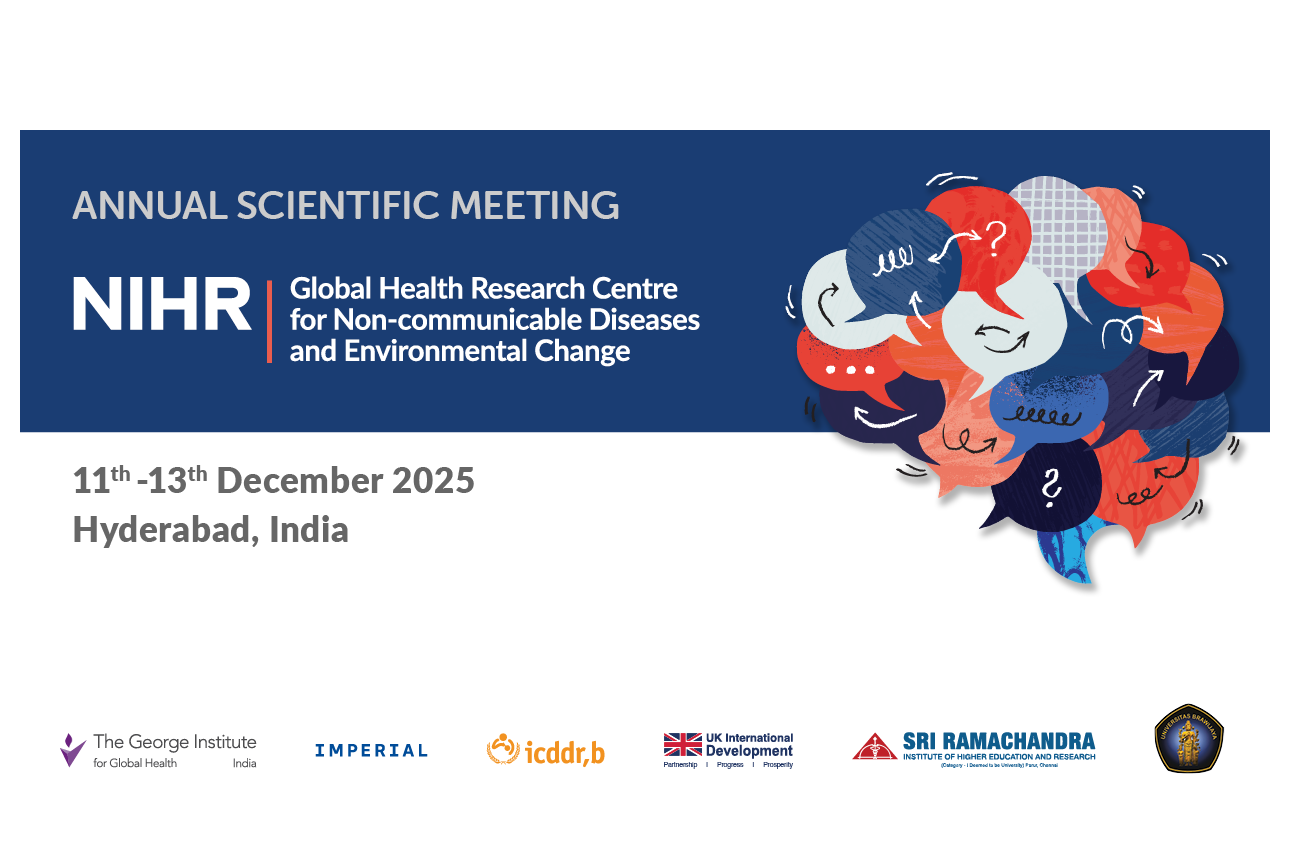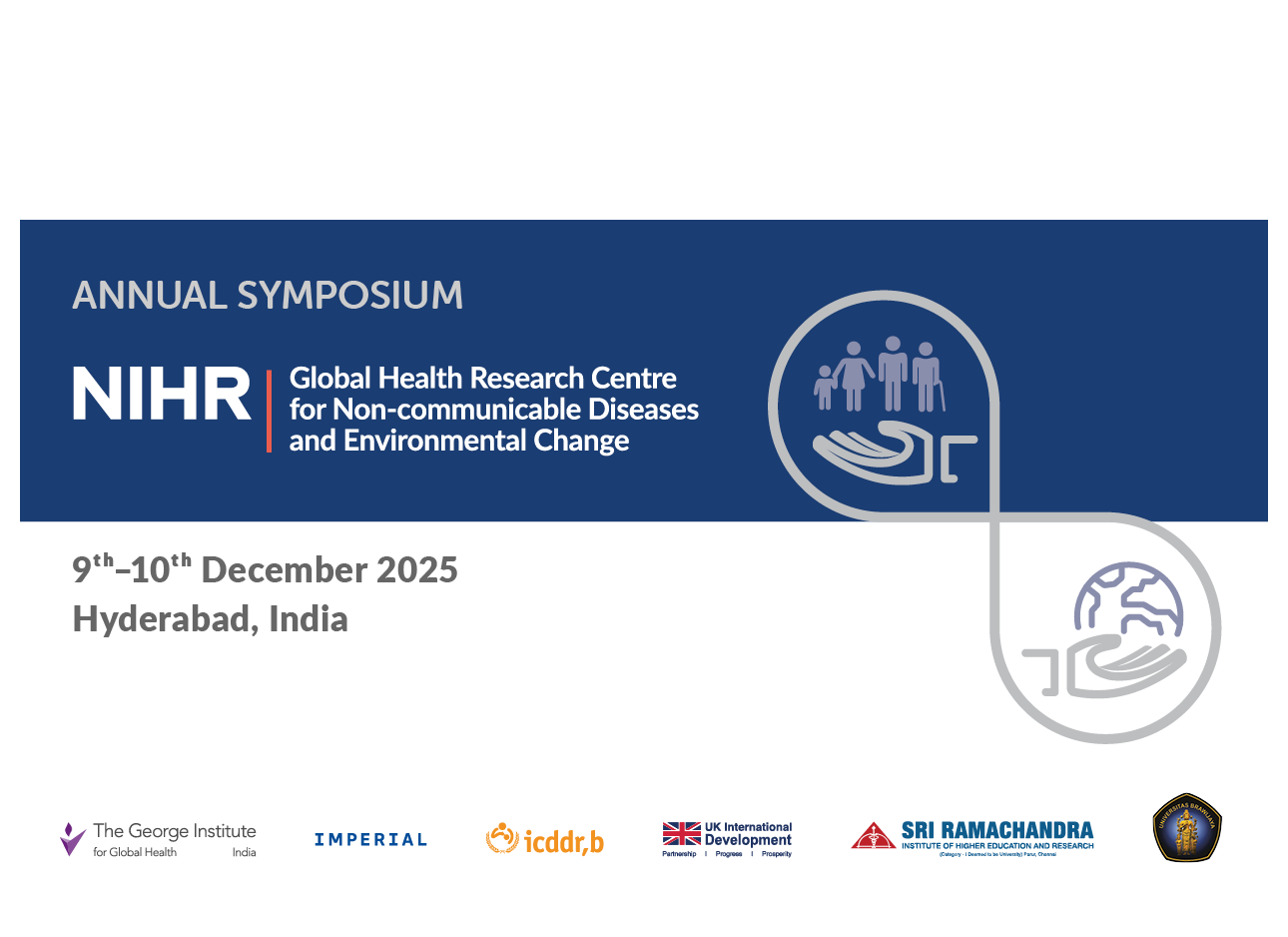Dhaka, Bangladesh, 20 March 2023. The recently established National Institute for Health and Care Research (NIHR) Global Health Research Centre for Non-communicable Diseases and Environmental Change was kicked-off today in Dhaka, Bangladesh at a dissemination seminar by the Non-Communicable Disease Control (NCDC) Program of the Directorate General of Health Services (DGHS), International Centre for Diarrhoeal Disease Research, Bangladesh (icddr,b), in partnership with Imperial College London and The George Institute for Global Health, India, Sri Ramachandra Institute of Higher Education & Research (India), and University of Brawijaya (Indonesia).
This NIHR Global Health Research Centre for Non-Communicable Diseases (NCDs) and Environmental Change is a five-year project with a £10 million funding support started from October 2022. The NIHR funds, enables and delivers world-leading health and social care research that improves people’s health and wellbeing and promotes economic growth. The Centres are part of the NIHR’s commitment to investing in global health research in developing countries that are eligible to receive Official Development Assistance from the UK aid budget.
The NIHR Global Health Research Centre for Non-communicable Diseases and Environmental Change is developing a program of policy-relevant research, research capacity strengthening and community engagement to tackle the dual challenges of a rapidly growing burden of non-communicable diseases (NCDs) and the threat of global environmental change in Low- and middle-income countries (LMICs) and improve the delivery of high-quality, equitable services for this dual threat, especially for marginalised populations most impacted by environmental change.
In Bangladesh, storm surges caused by tropical cyclones have led to an increase in water salinity across the coastal belt. This has harmful health effects on local populations, including increased blood pressure, progressive kidney disease and gestational hypertension in pregnant women.
Utilising the exiting government Primary Healthcare Systems, the centre will work to identify and test cost- effective, sustainable solutions to reduce salinity, with a focus on hypertension, cardiovascular diseases, and chronic kidney diseases in the coastal districts of Koyra Upazila, Khulna and Ashasuni Upazila, Satkhira, Bangladesh.
It will also work towards strengthening of Primary Health Care in Bangladesh and develop multisectoral interventions through active engagement with communities that are particularly vulnerable to the effects of environmental change and NCDs.
During the launch event, Dr Tahmeed Ahmed, Executive Director at icddr,b delivered the welcome address and hoped the centre would be able to develop low-cost sustainable solutions and advocate for themto prevent and address NCDs. Dr Aliya Naheed, Scientist at icddr,b, presented an overview of the Bangladesh Centre while Prof. Chistopher Millet from the Imperial College London, UK gave an overview of the global centre.
Mr Zahid Maleque, MP, the Honourable Minister for the Ministry of Health and Family Welfare (MoHFW), Government of Bangladesh, who graced the occasion as the Chief Guest of the event, said, “XXXXXXXXX.”
Dr Md. Anwar Hossain Howlader, Secretary, Health Services Division, MoHFW who was the special guest, said “XXXXXXXX”
Prof. Dr Abul Bashar Mohammad Khurshid Alam, Director General, DGHS gave the guest of honour speech and appreciated the effort made by CDC, DGHS and icddr,b He also said, “XXXXXXXXXX.”
The Bangladesh Centre will be directed by Dr Aliya Naheed, Scientist ICDR, in collaboration with the Non- Communicable Disease Control Program, Department of Public Health Engineering (DPHE), Bangladesh Water Development Board (BWDB), and technical support provided by the University of Dhaka, Bangladesh University of Engineering and Technology (BUET), Imperial College of London, University of Portsmouth, UK.
Prior to the launch event a scientific seminar on Non-Communicable Diseases (NCDs) and Environmental Change was held in the morning, in which , Dr Aliya Naheed presented a multi-component intervention model, called “COBRA-BPS strategy” for controlling hypertension in rural Bangladesh.
Prof. Dr Mohammad Robed Amin, Line Director, Non-Communicable Disease Control Program highlighted the initiatives undertaken by the Government of Bangladesh for controlling and treating tackle NCDs in Bangladesh.
Prof Christopher Millett, Imperial College, London; Dr Devarsatty Praveen, the Centre Director from The George Institute for Global Health, India and Prof. Mashfiqus Salehin, Bangladesh University of Engineering and Technology (BUET) delivered presentations during the scientific session chaired by Prof. Dr Mohammad Robed Amin.
Prof. Dr Ahmedul Kabir, Additional Director General (Planning and Development), DGHS was the Chief Guest of the scientific seminar.
Prof. Dr Md. Ruhul Amin, Director, Bangladesh Medical Research Council (BMRC), Md. Saifur Rahman, Superintending Engineer (Ground Water Circle), Department of Public Health Engineering (DPHE) and Md. Ziaul Haque, Director (Air quality), Department of Environment also spoke at the seminar.
Representatives from DGHS, DPHE, BWDB, Dhaka South City Corporation and Dhaka North City Corporation, Bangladesh Institutes of Development Studies, BAS, World Health Organization, World Bank Group, UNICEF, WaterAid Bangladesh, Helen Keller International, icddr,b, Dhaka University, BUET were also present.






